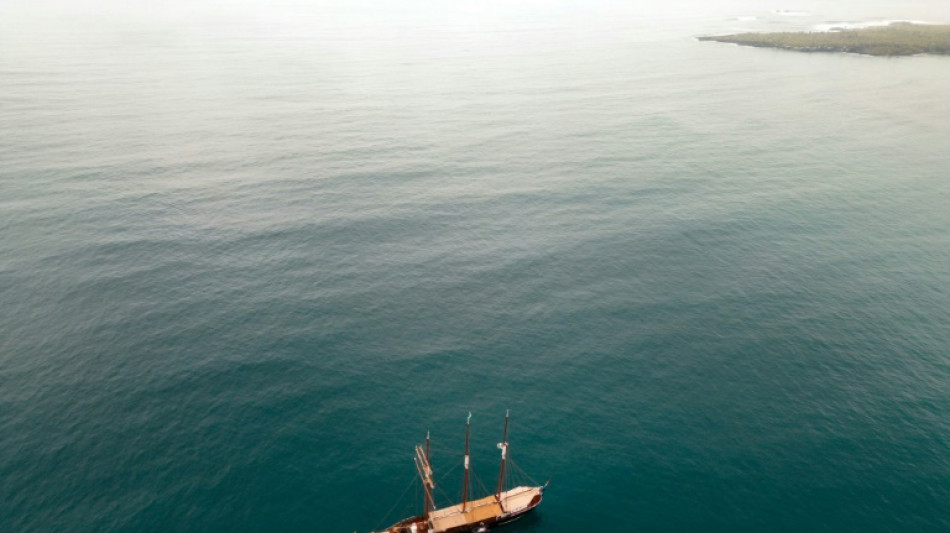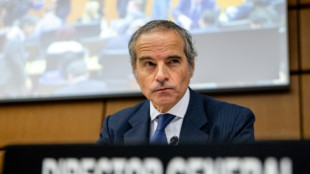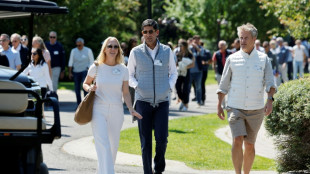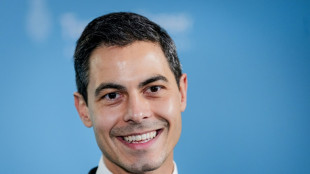
-
 Kremlin says agreed to halt strikes on Kyiv until Sunday
Kremlin says agreed to halt strikes on Kyiv until Sunday
-
Carrick calls for calm after flying start to Man Utd reign

-
 Djokovic to meet Alcaraz in Melbourne final after five-set marathon
Djokovic to meet Alcaraz in Melbourne final after five-set marathon
-
Italian officials to testify in trial over deadly migrant shipwreck

-
 Iran says defence capabilities 'never' up for negotiation
Iran says defence capabilities 'never' up for negotiation
-
UN appeals for more support for flood-hit Mozambicans

-
 Lijnders urges Man City to pile pressure on Arsenal in title race
Lijnders urges Man City to pile pressure on Arsenal in title race
-
Fulham sign Man City winger Oscar Bobb

-
 Strasbourg's Argentine striker Panichelli sets sights on PSG, World Cup
Strasbourg's Argentine striker Panichelli sets sights on PSG, World Cup
-
Jesus 'made love': Colombian president irks Christians with steamy claim

-
 IAEA board meets over Ukraine nuclear safety concerns
IAEA board meets over Ukraine nuclear safety concerns
-
Eurozone growth beats 2025 forecasts despite Trump woes

-
 Dutch PM-elect Jetten says not yet time to talk to Putin
Dutch PM-elect Jetten says not yet time to talk to Putin
-
Social media fuels surge in UK men seeking testosterone jabs

-
 Forest face Fenerbahce, Celtic draw Stuttgart in Europa League play-offs
Forest face Fenerbahce, Celtic draw Stuttgart in Europa League play-offs
-
US speed queen Vonn crashes at Crans-Montana, one week before Olympics

-
 Trump nominates former US Fed official as next central bank chief
Trump nominates former US Fed official as next central bank chief
-
New Dutch government pledges ongoing Ukraine support

-
 Newcastle still coping with fallout from Isak exit, says Howe
Newcastle still coping with fallout from Isak exit, says Howe
-
Chad, France eye economic cooperation as they reset strained ties

-
 Real Madrid to play Benfica, PSG face Monaco in Champions League play-offs
Real Madrid to play Benfica, PSG face Monaco in Champions League play-offs
-
Everton winger Grealish set to miss rest of season in World Cup blow

-
 Trump brands Minneapolis nurse killed by federal agents an 'agitator'
Trump brands Minneapolis nurse killed by federal agents an 'agitator'
-
Arteta focuses on the positives despite Arsenal stumble

-
 Fijian Drua sign France international back Vakatawa
Fijian Drua sign France international back Vakatawa
-
Kevin Warsh, a former Fed 'hawk' now in tune with Trump

-
 Zverev rails at Alcaraz timeout in 'one of the best battles ever'
Zverev rails at Alcaraz timeout in 'one of the best battles ever'
-
Turkey leads Iran diplomatic push as Trump softens strike threat

-
 Zelensky backs energy ceasefire, Russia bombs Ukraine despite Trump intervention
Zelensky backs energy ceasefire, Russia bombs Ukraine despite Trump intervention
-
'Superman' Li Ka-shing, Hong Kong billionaire behind Panama ports deal

-
 Skiing great Lindsey Vonn crashes at Crans-Montana, one week before Olympics
Skiing great Lindsey Vonn crashes at Crans-Montana, one week before Olympics
-
Slot warns Liverpool 'can't afford mistakes' in top-four scrap

-
 Paris show by late Martin Parr views his photos through political lens
Paris show by late Martin Parr views his photos through political lens
-
Artist chains up thrashing robot dog to expose AI fears

-
 Alcaraz outlasts Zverev in epic to reach maiden Australian Open final
Alcaraz outlasts Zverev in epic to reach maiden Australian Open final
-
French PM forces final budget through parliament

-
 French-Nigerian artists team up to craft future hits
French-Nigerian artists team up to craft future hits
-
Dutch watchdog launches Roblox probe over 'risks to children'

-
 Trump brands Minneapolis nurse shot dead by federal agents an 'agitator'
Trump brands Minneapolis nurse shot dead by federal agents an 'agitator'
-
Israel says killed 'three terrorists' in Gaza

-
 After Trump-fueled brawls, Canada-US renew Olympic hockey rivalry
After Trump-fueled brawls, Canada-US renew Olympic hockey rivalry
-
Eileen Gu - Olympic champion who bestrides rivals US, China

-
 Trump, first lady attend premier of multimillion-dollar 'Melania' documentary
Trump, first lady attend premier of multimillion-dollar 'Melania' documentary
-
US Senate eyes funding deal vote as government shutdown looms

-
 Cuddly Olympics mascot facing life or death struggle in the wild
Cuddly Olympics mascot facing life or death struggle in the wild
-
UK schoolgirl game character Amelia co-opted by far-right

-
 Anger as bid to ramp up Malaysia's football fortunes backfires
Anger as bid to ramp up Malaysia's football fortunes backfires
-
Panama court annuls Hong Kong firm's canal port concession

-
 Pioneer African Olympic skier returns to Sarajevo slopes for documentary
Pioneer African Olympic skier returns to Sarajevo slopes for documentary
-
Trump threatens tariffs on nations selling oil to Cuba

| VOD | -0.17% | 14.685 | $ | |
| RYCEF | -2.69% | 16 | $ | |
| RELX | -0.81% | 35.875 | $ | |
| CMSC | -0.21% | 23.645 | $ | |
| BTI | -0.13% | 60.13 | $ | |
| NGG | -0.1% | 84.965 | $ | |
| RIO | -2.64% | 92.68 | $ | |
| AZN | 0.39% | 92.95 | $ | |
| GSK | 1.21% | 51.275 | $ | |
| RBGPF | 1.65% | 83.78 | $ | |
| CMSD | 0.17% | 24.1 | $ | |
| JRI | 0.27% | 12.99 | $ | |
| BP | 0.42% | 38.2 | $ | |
| SCS | 0.12% | 16.14 | $ | |
| BCC | -1.57% | 78.93 | $ | |
| BCE | 0.14% | 25.52 | $ |

In Darwin's footsteps: scientists recreate historic 1830s expedition
Like Charles Darwin did in 1831, a group of scientists and environmentalists last year set sail from the English port of Plymouth, headed for the Galapagos islands off the coast of Ecuador.
But what they found on their arrival last month differed vastly from what naturalist Darwin saw while visiting the archipelago in 1835, in a trip key to developing his world-changing theory on natural selection.
The Galapagos today is under protection, part of a marine reserve and classified a World Heritage Site. Yet the area faces more threats than ever, from pollution and illegal fishing to climate change.
There to observe the challenges, with a well-thumbed copy of her great-great-grandfather's "On the Origin of Species" in hand, was botanist Sarah Darwin.
"I think probably the main difference is that, you know, there are people working now to protect the islands," the 60-year-old told AFP, onboard the "Oosterschelde," a refurbished, three-mast schooner built more than 100 years ago.
The ship has been on a scientific and awareness-raising expedition since last August, stopping so far in the Canary Islands, Cape Verde, Brazil and Chile among other locales.
- Darwin's 'heirs' -
In colonial times, the islands -- located in one of the world's most biodiverse regions -- served as a pit stop for pirates who caught and ate the giant turtles that call it home.
During World War II, the archipelago hosted a US military base.
"I think if (Darwin) were able to come back now and see the efforts that everybody is making, both locally and globally, to protect these extraordinary islands and that biodiversity -- I think he'd be really, really excited and impressed," the naturalist's descendant told AFP.
Sarah Darwin first visited the Galapagos in 1995, where she illustrated a guide to endemic plants. She then devoted herself to studying native tomatoes.
She also mentors young people as part of a project to create a group of 200 Darwin "heirs" to raise the alarm about environmental and climate threats to the planet.
Calling at several ports on the journey from Plymouth to the Galapagos, the Oosterschelde took on new groups of young scientists and activists at every stop, and dropped off others.
One of them, Indian-born Laya Pothunuri, who joined the mission from Singapore, told AFP the Galapagos "has a very important place in scientific terms."
She was there, she said, to improve the irrigation systems in the islands' coffee-growing regions.
"I plan to do it using recycled plastic, which also, again, is a big problem over here," she said, noting that plastic waste ends up being consumed by wildlife.
- Plastic peril -
In the Galapagos, the expedition members worked with researchers from the private Universidad San Francisco de Quito (USFQ), the Charles Darwin Foundation and the NGO Conservation International on both confronting invasive species and protecting endemic ones.
Last year, a study by the Charles Darwin Foundation found that giant turtles in the area were ingesting harmful materials due to human pollution.
Samples revealed that nearly 90 percent of the waste consumed was plastic, eight percent was fabric and the rest metal, paper, cardboard, construction materials and glass.
From Galapagos, the Oosterschelde set sail again on Sunday to continue its world tour, with stops expected in Tahiti, New Zealand, Australia and South Africa.
F.Mueller--VB



